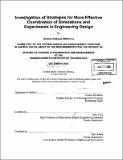Investigation of strategies for more effective coordination of simulations and experiments in engineering design
Author(s)
Dimitriou, Aristos Orpheas
DownloadFull printable version (11.29Mb)
Other Contributors
System Design and Management Program.
Advisor
Dan Frey.
Terms of use
Metadata
Show full item recordAbstract
The objective of this thesis is to lay the foundation for developing effective strategies for coordinated use of computational simulation and experiments in engineering design. The primary research objectives are to explore the drivers behind the use of simulations and experiments in industry as related to decision making. We analyze how simulation development integrates into the engineering process, and analyze current simulation strategies as they relate to the product development. The intent is to illuminate the issues surrounding the application of simulation and experimentation that will lead to the ability to define a set of corporate strategies that will enable companies to better integrate simulations and experiment into their existing product development process. This thesis suggests a set of Hypothesis related to decision making in engineering, and probes into one of these hypotheses to investigate the confidence level engineers exhibit when required to make a decision based on the presentation method of a simulation. The Hypotheses discussed in this thesis provide a starting point from which to explore dissertations on human-engineering process integration. By better understanding the human in the engineering process, we can better understand the engineering process.
Description
Thesis (S.M.)--Massachusetts Institute of Technology, System Design and Management Program, February 2006. Includes bibliographical references (p. 104-106).
Date issued
2006Department
System Design and Management Program.Publisher
Massachusetts Institute of Technology
Keywords
System Design and Management Program.